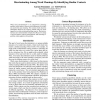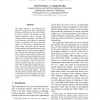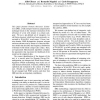105 search results - page 13 / 21 » Word Sense Disambiguation Using Lexical Cohesion in the Cont... |
277
click to vote
FLAIRS
2011
2011
Impact of Word Sense Disambiguation on Ordering Dictionary Definitions in Vocabulary Learning Tutors
14 years 5 months ago
Past research has shown that dictionaries and glosses can be beneficial in computer assisted language learning, particularly in vocabulary learning. We propose that L2 vocabulary ...
AAAI
2004
15 years 3 months ago
2004
Word sense discrimination is an unsupervised clustering problem, which seeks to discover which instances of a word/s are used in the same meaning. This is done strictly based on i...
101
click to vote
EMNLP
2008
15 years 3 months ago
2008
This paper describes a novel Bayesian approach to unsupervised topic segmentation. Unsupervised systems for this task are driven by lexical cohesion: the tendency of wellformed se...
113
click to vote
EMNLP
2004
15 years 3 months ago
2004
This paper presents Domain Relevance Estimation (DRE), a fully unsupervised text categorization technique based on the statistical estimation of the relevance of a text with respe...
EMNLP
2009
14 years 11 months ago
2009
This paper presents a supervised method for resolving metonymies. We enhance a commonly used feature set with features extracted based on collocation information from corpora, gen...



